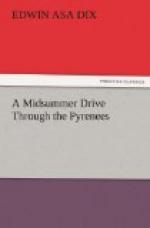[16] ELLIOTT: Old Court Life in France.
Time had not jogged on so far, in journeying from Orthez to Pau, as to forget all his mediaeval ways,—his promptings to strife and feuds, his liking for adventures. Henry had abundance of them, in his running fire against his neighbor-enemies, in his hot Protestant struggles against the Medicis, in his hotter fight for the throne of France. There are both meats and sweetmeats in his career,—strong deeds and knightly diversions. “These old wars are the most poetic in French history; they were made for pleasure rather than interest. It was a chase in which adventures, dangers, emotions were found, in which men lived in the sunlight, on horseback, amidst flashes of fire, and where the body as well as the soul had its enjoyment and its exercise. Henry carries it on as briskly as a dance, with a Gascon’s fire and a soldier’s ardor.... This is no spectacle of great masses of well-disciplined men coming heavily into collision and falling by thousands on the field, according to the rules of good tactics. The king leaves Pau or Nerac with a little troop, picks up the neighboring garrisons on his way, scales a fortress, intercepts a body of arquebusiers as they pass, extricates himself pistol in hand from the midst of a hostile troop, and returns.... They arrange their plan from day to day; nothing is done unless unexpectedly and by chance. Enterprises are strokes of fortune.... To act, to dare, to enjoy, to expend force and trouble like a prodigal, to be given up to the present sensation, be forever urged by passions forever lively, support and search the extremes of all contrasts, that was the life of the sixteenth century."[17]
[17] Tour Through the Pyrenees.
Exciting incidents abound among Henry’s dashing forays. He exposed himself to every risk he asked of his men, deaf even to their own entreaties that he should take more care of his life. More than once it was his personal leadership alone that carried the day. For example, there was a hostile city on the river Lot. Henry coveted it. Its garrison was strong; its governor scoffed: “a fig for the Huguenots!” Henry would brave defeat sooner than brook defiance. He marched to the town at once. “It was in the month of June,” as Sully relates it in his Memoirs, “the weather extremely hot, with violent thunder but no rain. He ordered us to halt in a plantation of walnut trees, where a fountain of running water afforded us some refreshment;” and after a brief rest, he disposed his little army, and planned his attack:




